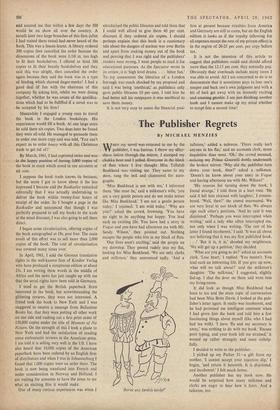The Publisher Regrets
By MICHAEL MENZIES
WtiEN my novel was returned to me by the publisher, 1 was furious. 1 threw my after- shave lotion through the mirror, 1 stamped my chukka boot and I yelled. Everyone in the block of flats where 1 live thought Miss Tallulah Bankhead was visiting me. They came to my door, rang the bell and clamoured for auto- graphs.
`Miss Bankhead is not with me,' I informed them. 'She must be,' said a milkman's wife, 'you are a very gentle person and do not make noises like Miss Bankhead.' I am not a gentle person today,' I rejoined. 'I am wild today.' Why are you?' asked the crowd, frowning. 'You have no right to be anything but happy. You lead such an exciting life. You have had a story in Vogue and you have had afternoon tea with Mr. Sandy Wilson,' they pointed out. Nothing escapes the people who live in my block of flats.
'Our lives aren't exciting,' said the people on my doorstep. They peered rudely into my flat, looking for Miss Bankhead. 'We are only clerks and milkmen,' they announced sadly. 'And a
'Borne any fardels lately?'
tailoress,' added a tailoress. 'There really isn't anyone in his flat,' said an accounts clerk, more inquisitive than most. `Oh,' the crowd moaned, noticing my Prince Gourielli -bottle underneath the broken mirror. 'Why did the publisher turn down your book, then?' asked a milkman. 'Doesn't he know about your story in Vogue and having afternoon tea with Mr. Wilson?'
'His reasons for turning down the book, I found strange,' I told them in a hurt tone. 'He said it left him strained with laughter,' I remem- bered. 'Well, then?' the crowd murmured. We are very loyal in our block of flats. We always sign each other's petitions. 'And he said it was disjointed.' Perhaps you were interrupted when writing,' said a lady who often interrupted me, not only when I was writing. 'The rest of his letter I found incoherent,' I said. 'It was all about not believing that it was my first published book. . . ."But it is, it is,' shouted my neighbours. 'We will get up a petition,' they decided.
'What are you going to do?' asked an accounts clerk. 'Lose heart,' I replied. 'You mustn't. You lead such an interesting life. If you give up now, what will we talk about'?' said the milkman's daughter. The milkman,' I suggested, slightly fed-up. I shut the door on them and went into my living-room.
It did look as though Miss Bankhead had been to tea and the main topic of conversation had been Miss Bette Davis. I looked at the pub- lisher's letter again. It really was incoherent, and he had promised me intelligent comment when I had given him the book and told him a few fascinating things about myself (like who I had had tea with). 'I have 'flu and my secretary is away,' was nothing to do with my book. 'Excuse poor typing, and your book left me strained,' it wound up rather strangely and most unhelp- fully.
I decided to write to the publisher.
I picked up my Parker 51—a gift from my mother. 'I cannot accept your rejection slip,' I began, 'and return it herewith. It is disjointed, and incoherent.' I felt much better.
Another publisher has my book now. He would be surprised how many milkmen and clerks are eager to hear how it fares. And a tailoress, too.


































 Previous page
Previous page